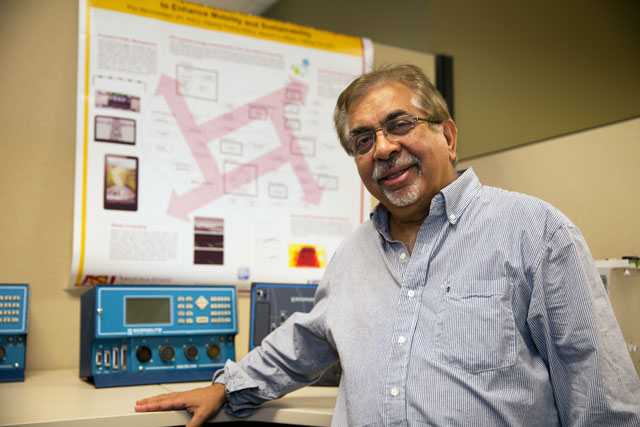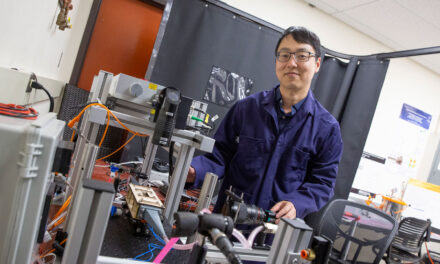
Mirchandani named INFORMS fellow for pioneering advances in network traffic control

Above: Pitu Mirchandani, the Avnet Chair in Supply Chain Networks, has been named a fellow in the Institute for Operations Research and the Management Sciences. Photographer: Jessica Hochreiter/ASU
Research discoveries that help people and systems to make informed decisions have earned Pitu Mirchandani a prestigious honor.
In November 2015, Mirchandani, an industrial engineering and operations research professor, was named a fellow in the Institute for Operations Research and the Management Sciences (INFORMS).
This is a distinguished honor reserved for very few members — only eight were granted fellow status last year.
He was elected for fundamental research contributions to dynamic and stochastic (randomly determined) networks, location models, adaptive control of transportation systems, and traffic modeling and analysis.
Outstanding contributions in transportation systems
In all of his research areas, Mirchandani’s basic goal is to provide appropriate solutions to managing complex systems, enabling decision-makers to make quick planning and operational decisions under conditions with uncertainties and random variations.
Mirchandani is a pioneer in this area, particularly in incorporating advanced modeling and information technologies into transportation and logistics operations.
This involves using computational technologies to inform and guide decision-making in areas such as transportation and power systems, water distribution systems, urban infrastructure planning and development, and healthcare.
In the field of transportation, Mirchandani is known for the development and implementation of the Real-time Hierarchical Optimizing Distributed Effective System (RHODES), which is a self-learning traffic signal control system that observes approaching traffic at intersections using sensors and sets traffic signals in real-time to minimize delays for drivers and the energy consumption of their vehicles.
“This system observes vehicles that are coming and gives the right amount of green light to those directions with the most need,” said Mirchandani.
He is also currently developing MIDAS, a cyber-physical system for better managing complex urban traffic that uses smart phones, image-based sensors and a cloud computing platform.
Exciting students is a career highlight
Mirchandani likes operations research because he works on important problems that affect a large number of people.
He also enjoys giving his doctoral students worthy and exciting challenges for their dissertation research.
“My goal is to create beautiful models and algorithms alongside my students,” said Mirchandani, “It’s one of the best parts of my job. I love getting students excited about something they’ve never done before.”
Additional current projects, supported by several of his Ph.D. students, include helping blood bank supply chains to make better decisions on ordering, inventories and distribution of various blood types.
He is also doing research that aims to make electrical vehicle use more efficient by locating battery-swapping stations with optimal inventories.
Tackling the logistics of automated vehicles
Mirchandani plans to tackle at least one more big challenge before even thinking of retirement: operations research related to automated vehicles.
“Managing the traffic and logistics of automated vehicles will be a significant challenge in operations research,” he said.
Should we have special streets for robot-controlled vehicles? Should they travel together in groups somewhat like train cars in a railway system? Should traffic lights favor these vehicles because they’re more predictable?
“These types of questions have not been worked out yet—and they are ideal for professionals in operations research,” he said.
After a 40-year career, Mirchandani is ready to help inform the next generation of logistics having to do with network flow control.
Mirchandani is the Avnet Chair in Supply Chain Networks, the director of the Advanced Traffic and Logistics: Algorithms and Systems (ATLAS) Laboratory and a senior sustainability scientist with the university’s Julie Ann Wrigley Global Institute of Sustainability. He has attracted funding in excess of $12 million as a principal or co-principal investigator since beginning his career in Arizona and has given more than 250 technical presentations at conferences and workshops.
Media Contact
Rose Serago, [email protected]
Ira A. Fulton Schools of Engineering



































